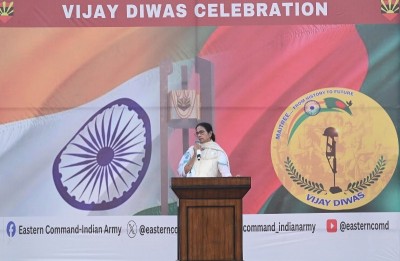 Punjab
Punjab
A cry from the fields: Empowering Punjab’s farmers with cold storage and infrastructure
Punjab, the land of fertile plains and abundant harvests, finds itself in a paradox of plenty as it watches its small-scale farmers, the backbone of the country’s agrarian economy, struggle with post-harvest losses.
The root of the problem lies in the inadequacy of cold storage facilities in rural areas and the lack of food processing units, forcing farmers to accept below-par compensation for their laborious work.
Farmers in rural areas like Bhaini Bagha and Bathinda lament the absence of small cold storage facilities and processing plants. Even as their lands yield a rich harvest, their income dwindles. Ram Singh, a capsicum grower, illustrates this predicament, stating that prices crashed to a mere Rs 2.50 per kg from Rs 23-24 the previous year. High transportation costs to big cities and the inability to control the supply line exacerbate the issue.
Similarly, the predicament of small potato farmers is poignant. Sukhmander Singh notes how larger farmers, with their financial muscle, can afford to rent cold storage facilities, while small farmers are left in the cold, literally, selling their produce at low costs.
The narrative of despair doesn’t end here. Cauliflower farmer Gajjan Singh had to plow his standing crop due to low market prices. In a country that is home to millions of food-insecure individuals, such waste is a bitter pill to swallow. Gajjan Singh raises a valid point – if there were enough processing plants, they could grow more, reduce wastage, and improve their financial stability.
These stories underline the necessity of government intervention. Tarjeet Singh, a farmer from Motipur Khalsa village, points out that fresh produce is always preferred, making cold storage an unattractive option. What can be a game-changer here is the opening of more processing units by the government. Capsicum grower Manjit Singh echoes this sentiment, remarking that the government’s inertia in supporting farmers through infrastructure development is hurting the agricultural community.
It’s not a hopeless situation, though. There is consensus on the solution among farmers and agricultural officers. Sukhdip Hundal, Deputy Director of Horticulture from Kapurthala, sees the establishment of food processing units as a boon for farmers, reiterating the farmers’ call.
Our small farmers do not ask for much. They ask for a chance to take control of their produce, to process their vegetables and secure a fair price. They ask for the support of the government in providing the necessary infrastructure. As a state, it is crucial that we listen to these voices from the fields and empower them to sustain Punjab’s, and in turn, India’s food security. The creation of small, accessible cold storage facilities and food processing units can potentially revolutionize rural agriculture, reducing waste, increasing farmers’ income, and ultimately leading to a stronger, more resilient agrarian economy.
(Image and Text Credit: Khalsavox.com)
Support Our Journalism
We cannot do without you.. your contribution supports unbiased journalism
IBNS is not driven by any ism- not wokeism, not racism, not skewed secularism, not hyper right-wing or left liberal ideals, nor by any hardline religious beliefs or hyper nationalism. We want to serve you good old objective news, as they are. We do not judge or preach. We let people decide for themselves. We only try to present factual and well-sourced news.







